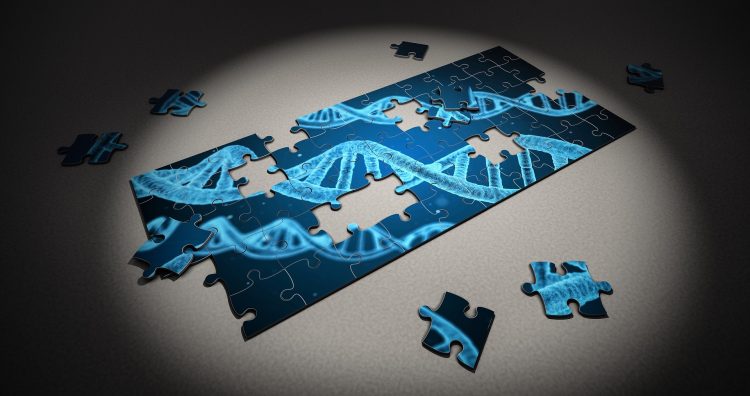Katie Compton, Policy & Politics editor
Genetic testing is more accessible than ever. For around $100, anyone can order a direct-to-consumer DNA spit kit to learn about her ancestry. Doctors are using genetic tests to diagnose, treat and prevent disease. And ambitious research projects such as All of Us, UK Biobank, and Personal Genome Projects are recruiting hundreds of thousands of people to undergo whole genome sequencing to help them understand the role that our genes play in our health.
However, our ability to read through a person’s genetic code has outpaced our ability to actually understand these data. Sequencing frequently picks up “uncertain” changes in a person’s genome. These typos in the genetic code might be mutations that increase a person’s risk of disease, or they could be completely harmless. Sometimes it can take years for researchers to figure out what a particular genetic variant means.
So, when someone receives a genetic testing report from her doctor, or from a study she’s participated in, the meaning of those results could change over time. This ambiguity raises a tricky ethical question – what should a researcher or healthcare provider do if they learn something new about a person’s genomic data long after her DNA was first sequenced?

Genomic testing often yields uncertain results because we have an incomplete understanding of our DNA. Image by Arek Socha from Pixabay (free for commercial use)
Genomics in the clinic vs genomics in the lab
In medicine, doctors and genetic counsellors have started to define when they have an obligation to reach out to patients to let them know that their results have been reinterpreted. There is a growing consensus that it is important to let a patient know if an uncertain genetic change has been “upgraded” to mutation, or if a mutation has been “downgraded” and is no longer believed to be associated with a disease.
However, there is little guidance for researchers about when – or even if – they should try to update people about their genomic or genetic results. Last year, the American Society of Human Genetics (ASHG) published a position statement that attempts to fill this gap. The ASHG workgroup that developed these guidelines included researchers from Canada and the U.S., including Dr. Yvonne Bombard from the University of Toronto.
Dr. Bombard is a genomics health services researcher, and her lab is working on a number of projects to help ensure that the potential rewards of genomic testing outweigh the potential risks.
“Re-contacting research participants to keep them abreast of new knowledge is a desirable and important goal,” she says. “The problem is that we live in a world of limited resources, and the cost of achieving this goal can be onerous – especially in research, which often is time limited and has limited budgets. Scientists need guidelines to help guide them as to when there is a responsibility to re-contact their research participants to offer revised test information.”
When should researchers reach out?
According to Dr. Bombard, the ASHG workgroup looked at a variety of sources to develop the position statement, including existing clinical guidelines, ethical and legal principles, case law, and studies on patients’ and providers’ perspectives on re-contact. Through this process, the workgroup began to identify situations when researchers should try to update participants, and when researchers should not be expected to attempt re-contact.
“The goals of research are not the same as delivering clinical care,” Dr. Bombard says. “The goal of research is … to produce new knowledge, benefit society as a whole. Direct benefit to individual research participants is wonderful when it occurs, but it is not the primary purpose of the research.”
In the end, the ASHG workgroup came up with a series of 12 re-contact recommendations. For example, if a study is still ongoing, and the researcher learns that an uncertain genetic change is now considered to be a mutation that would impact the participant’s medical care, the workgroup “strongly recommends” that the researcher make an attempt to let the participant know. However, they state that researchers don’t have responsibility to update participants if their study has ended and there’s no more funding, or if a participant isn’t returning their calls.
Above all, the workgroup hopes that researchers will look to these guidelines when they are designing their studies and develop a plan for re-contacting participants before the need arises.
“As part of that plan, research participants should be alerted to the likelihood that interpretations of results may change over time and be given the opportunity to provide informed consent regarding the plan for return of results, including initial and reinterpreted results,” says Dr. Bombard.
The next update?
As with genomic test results, the ASHG position statement is likely not the final word. Researchers will continue to probe the human genome for more answers about human health, and new questions around their responsibilities to re-contact participants will come up.
“The big unanswered question is ‘how’?” Dr. Bombard says. “There are real opportunity costs and challenges to [re-contacting participants].”
Technological solutions, such as improving and expanding electronic medical records, might provide ways to automate the re-contact process, reducing the burden on researchers. Giving patients access to their data and empowering them to keep track of their own results could be another solution. But researchers are going to need to revisit the issue of re-contact along the way.
“We anticipate that recommendations across both clinical and research contexts will evolve as we acquire more experience and evidence to inform them,” Dr. Bombard says. “The onus is now on our community to build that evidence-base to ensure equitable and sustainable re-contacting practices.”
~30~





